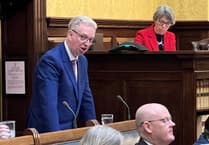The following is our full report of this week’s Tynwald debate following Dr Rosalind Ranson’s employment tribunal.
It took place before the resignation from the Council of Ministers of David Ashford.
Sweeping government reform has been promised in the wake of Dr Rosalind Ranson’s employment tribunal.
The chief minister addressed Tynwald after the tribunal ruled unanimously in favour of Dr Ranson and included scathing criticism of health chiefs.
Alfred Cannan described the judgment as ‘uncomfortable reading for many’ which has ‘regrettably not reflected well on the professionalism of our public service’.
However, the chief minister then failed to address the tribunal or its outcome directly, insisting that the case ‘remains sub judice, as various matters still need to be determined and settled by the tribunal’.
A number of members pressed the Mr Cannan on the issue, asking more questions.
But President of Tynwald Laurence Skelly ruled them out of order, saying the chief minister couldn’t comment on the case and was there instead to talk about future government action.
This is despite that it is very difficult to prejudice civil court proceedings – and there is no suggestion that criminal proceedings could be undertaken.
In addition, the Ranson tribunal report could have been discussed under parliamentary privilege with no fear of defamation action.
However, Mr Cannan did concede that: ‘This tribunal has raised a number of substantive questions regarding government performance and culture and has understandably damaged confidence in government.
‘I stand today to acknowledge the deep discomfort that we feel with the evidence and findings of this tribunal, and I acknowledge our shortcomings.’
He promised a range of reforms to the island’s public sector, saying: ‘It is clear that we need to do more now and we need to do it faster.’
REFORMS
Following the surprise announcement on Monday that the island’s top civil servant, Chief Secretary Will Greenhow, was retiring the government would be ‘taking the opportunity to reflect on its position, its roles and its responsibilities’.
Mr Cannan will update Tynwald on the role in October.
A review will be made into the Office of Human Resources and its effectiveness.
Mr Cannan said: ‘It is vital that departments are being given full and proper advice in respect of the fair treatment of staff.’
An announcement regarding how this review will be undertaken will be made by the end of this month.
Non-executive ministerial advisers will be appointed to departmental boards ‘to provide more challenging levels of advice and scrutiny to government performance’.
Plans regarding this will be laid before Tynwald in July.
Across the whole of government, the code for public servants, last updated in January 2017, will be reviewed and updated.
Actions agreed by Tynwald in February 2021 on whistleblowing will be accelerated.
The Council of Ministers will introduce, by the end of this year, an employee recognition programme, and they will also bring forward a protocol that will allow for either a part or whole of a Department to be put into a special measures programme where Council believes there is substantial evidence of failings.
The SAVE Programme, commissioned by the Treasury over the period 2017 to 2019 will also receive a renewed and urgent attention.
Mr Cannan said: ‘It is clear to me that organisational culture needs to be refreshed and revitalised.
‘Across parts of the organisation we are failing to properly engage and listen with our workforce.
‘There is too much top-down management and not enough bottom-up problem solving or listening.’
QUESTIONS
Speaker of the House of Keys, Juan Watterson, began the question session following Mr Cannan’s statement, and branded former chief executive of the DHSC, Kathryn Magson a ‘megalomaniac’.
He said: ‘In terms of the new review into OHR and others, will that include recruitment processes such as those that allow a megalomaniac to end up running the Department of Health and Social Care?’
In response, Mr Cannan said that ‘across an organisation of 7,500 or so full-time equivalent employees, I think it is unrealistic to expect there will not be issues from time to time, but the most important thing is those matters are being dealt with professionally and appropriately’.
Garff MHK Daphne Caine had blistering criticism for the chief minister’s statement.
She said: ‘While he found deep discomfort and acknowledged the shortcomings, I was angry and incredulous at page after page of revelations.
‘Although there is a clear undertaking here to fix, to have a reset of organisational culture, there was no real hint of regret or apology.
‘I wonder where the Chief Minister, given the findings already sits on that?’
President of Tynwald Laurence Skelly refused to allow this section of Mrs Caine’s question.
Tim Glover, MHK for Arbory, Castletown and Malew, levelled his criticism at former Health Minister David Ashford, who has this week faced calls for his resignation.
Mr Glover said: ‘I am just questioning how Council of Ministers are going to have any credibility in bringing [the proposed employee recognition programme] forward when one of the members of the Council of Ministers is part of the story?’
In response, Mr Cannan came to Mr Ashford’s defence, saying: ‘I think we are all part of the story, Mr President.
‘I am afraid you cannot escape there are many issues, substantive governmental-wide issues, that are something that we all have to take responsibility for.’
Douglas South MHK Claire Christian was even more direct with her line of questioning, arguing that ‘we need to shake this tree once and for all from bad apples’.
She asked if the chief minister has confidence in Mr Ashford and if he has confidence in director of public health Dr Henrietta Ewart.
When she attempted to ask if Miss Magson paid Manx tax during her time on the island, she was cut off my President Skelly.
Despite her argument that this was a contractual question not related to the tribunal, her question was disregarded.
Mr Cannan spoke of the current cost of living crisis and Mr Ashford’s role as Treasury Minister, and stated that criticism regarding the chain of command and breakdowns in communication will undoubtedly emerge in the upcoming Covid-19 review.
Mr Cannan also accepted that in wake of the tribunal and its finding and the events of the last two years, there may well be a need to change and refocus emphasis on culture and way the government engages as an organisation with its employees.
Further questions were then blocked by President Skelly regarding good governance and the Nolan Principles.
These principles can also be described as the ‘Seven Principles Underpinning Public Life’.
Selflessness:
Holders of public office should act solely in terms of the public interest.
Integrity:
Holders of public office must avoid placing themselves under any obligation to people or organisations that might try inappropriately to influence them in their work.
Objectivity:
Holders of public office must act and take decisions impartially, fairly and on merit, using the best evidence and without discrimination or bias.
Accountability:
Holders of public office are accountable to the public for their decisions and actions and must submit themselves to the scrutiny necessary to ensure this.
Openness:
Holders of public office should act and take decisions in an open and transparent manner.
Honesty:
Holders of public office should be truthful.
Leadership:
Holders of public office should exhibit these principles in their own behaviour and treat others with respect.
Douglas East MHK Joney Faragher questioned whether any of the seven principles had been broken – but was denied an answer by President Skelly.
Douglas Central MHK Chris Thomas also mentioned the Nolan Principles, as did Douglas North MHK John Wannenburgh.
Mr Thomas has been vocal this week in his calls for Mr Ashford’s resignation.
He stated that the chief minister was missing the elephant in the room, and branded the statement a ‘waste of time’.
Mr Cannan insisted the focus for this particular sitting was on moving forward.
He did acknowledge that there would be room for a follow-up debate to be tabled once the sub judice rules were lifted.
SUPPORT
The Manx Independent received various messages in support of Dr Ranson.
Many also corroborate her claims against the DHSC.
In one letter sent to our editor, two medical consultants who were previously employed by the Isle of Man Government, and now live in Southampton, told us of their own experiences.
They stated that ‘concerns about clinical safety and governance structures have been raised by both of us, both informally and formally and with other consultants, during the time that we were working on the island spanning the tenures of David Anderson, Howard Quayle, Kate Beecroft and David Ashford’. Their experiences here are ultimately why they chose to leave the island.
Their letter is published in full on page 10 of this week’s newspaper.


-(1).jpeg?width=209&height=140&crop=209:145,smart&quality=75)

